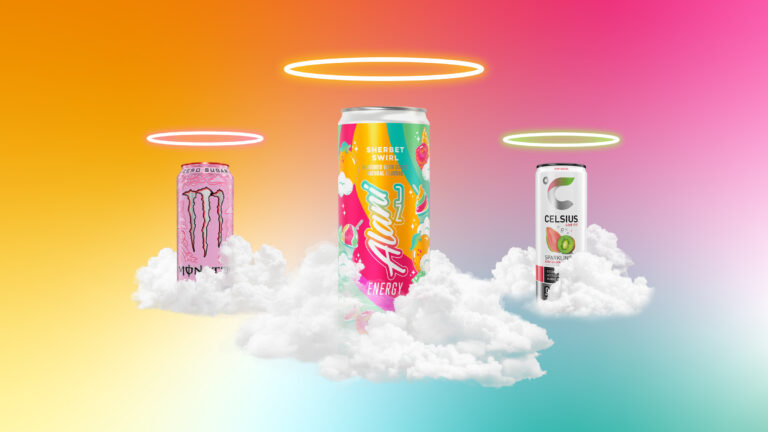big gulp
How energy drinks got a makeover

Photo illustration: Christine Kao/STAT
You don't need to look further than a can of Alani Nu (center stage in the above illustration) to see that the $22 billion energy drink industry has gotten a makeover. Long dominated by labels like Monster and Red Bull that use extreme sports swagger to appeal to young men, the industry is tapping into the aesthetics of health and wellness to reach new demographics and continue its exponential growth.
But it's not just aesthetics. Many of the newer brands tout "better for you ingredients," STAT's Sarah Todd reports, from biotin to lion's mane mushrooms. Despite the magical powers one might assume "lion's mane mushrooms" have, many energy drinks still contain supercharged doses of caffeine that are particularly risky for children, teenagers, pregnant and breastfeeding women, and people with underlying heart conditions. Health experts say the new wellness-themed marketing may be worsening consumer confusion over the risks. Read more from Sarah.
cancer
Study shows testosterone does not increase cancer risk for trans people
Trans people who use testosterone are not at a higher risk of gynecological cancers compared to cisgender women for at least the first few years using the hormone, according to a large study out of Amsterdam published yesterday in eClinicalMedicine. While experts haven't historically had major concerns about a link here, there also hasn't been much long-term research on the potential connection. The data comes just a few weeks after HHS released its report on gender dysphoria, declaring existing evidence for gender-affirming care for youth to be insufficient. (The American Academy of Pediatrics immediately rebuked that report.)
In the study, researchers analyzed medical records for all trans patients assigned female at birth who visited one medical center between 1972 and 2018. That was almost 2,000 patients total, making it the largest study to date looking at gynecological tissue of trans folks using testosterone, the authors wrote. People used testosterone at the clinic for five years on average.
Nobody in the study was diagnosed with cancer in their uterus, ovaries, vagina, or vulva. Still, even longer-term research is needed, the authors added, especially for people who choose not to have their reproductive organs removed in surgery.
deja vu
Elizabeth Holmes rises again — well, her partner does
Elizabeth Holmes is serving an 11-year prison sentence for misleading investors and is barred from participating in federal health programs for 90 years. But somehow, her dream of a diagnostic testing revolution is once again the talk of health care. The emergence of Haemanthus, a company formed by Holmes' partner, Billy Evans, triggered a mix of shock, anger, and rueful skepticism yesterday.
"It's kind of astonishing to see someone so close to that previous debacle trying to launch something so similar," Vikas Saini, president of nonpartisan think tank the Lown Institute, told STAT. "I guess people are always striving in this country." Read more from Casey Ross and Jonathan Wosen on how people in the health space are reacting to the news.


No comments